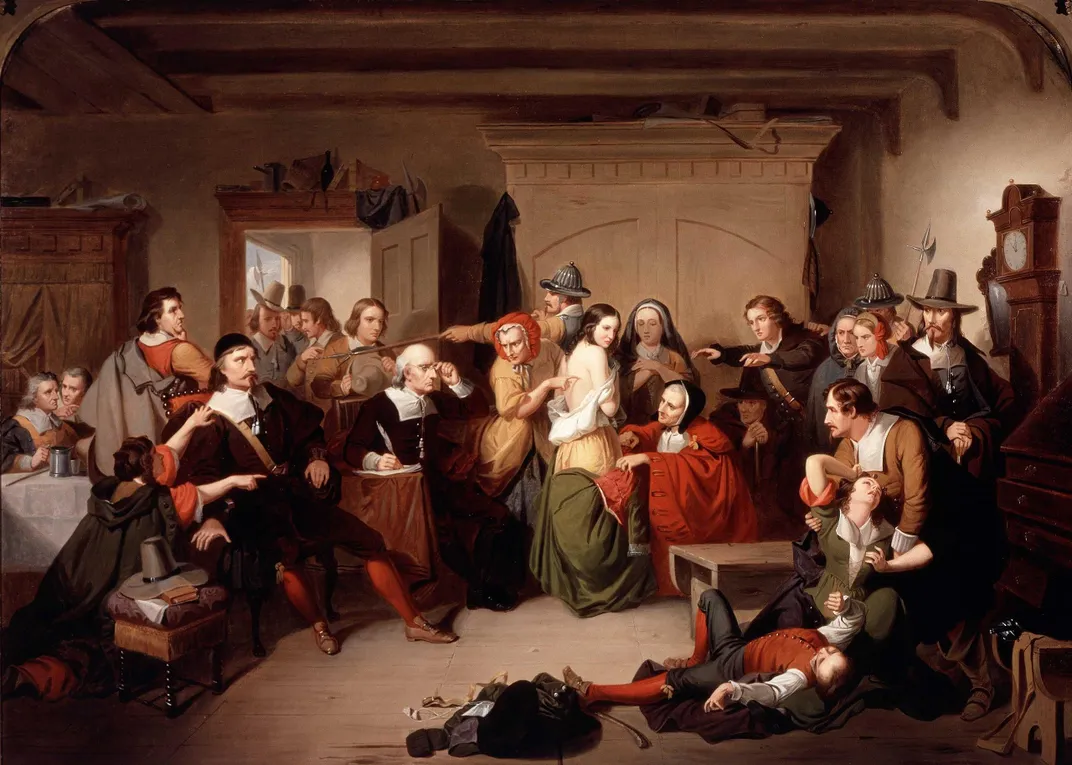This Eighth-Grade Class Wants to Clear the Name of an Accused Salem ‘Witch’
Elizabeth Johnson Jr. was sentenced to death in 1693 but escaped execution after receiving a reprieve from Massachusetts’ governor
:focal(996x639:997x640)/https://tf-cmsv2-smithsonianmag-media.s3.amazonaws.com/filer/d2/26/d226d125-0178-4712-8441-106e7879e3ee/1920px-witchcraft_at_salem_village.jpeg)
Elizabeth Johnson Jr. was a 22-year-old woman living in colonial Massachusetts when a court found her guilty of a sensational crime: witchcraft.
Johnson numbered among more than 150 people accused of supernatural transgressions during the infamous Salem Witch Trials of 1692 and 1693. In a series of sham legal proceedings spurred by mass hysteria and xenophobia, residents of Salem and nearby towns accused each other of practicing the “Devil’s magic.”
Authorities executed 20 people for their supposed crimes, hanging 19 individuals and crushing 1 elderly man to death, as Jess Blumberg reported for Smithsonian magazine in 2007. The trials represented the “largest and most lethal witch hunt in American history,” wrote historian Emerson W. Baker in the 2014 book A Storm of Witchcraft: The Salem Trials and the American Experience.
Thanks to the efforts of the accused, some of whom petitioned for legal reparations in the 1700s, and their descendants, the majority of Salem’s “witches” have been cleared of any crimes. A state legislative measure passed in 1957 and amended in 2001 officially wiped most victims’ records clean, notes Katie Lannan for State House News Service.
But for some unknown reason, Johnson’s name was never cleared—and so her conviction stands today. Condemned to die but granted a reprieve before her execution, she’s the only Salem “witch” still in need of an official pardon, reports William J. Kole for the Associated Press (AP).

More than three centuries after Johnson’s death in 1747, an eighth-grade civics class at Massachusetts’ North Andover Middle School is trying to right this historical wrong. As Andrew Brinker reports for the Boston Globe, teacher Carrie LaPierre and her 13- and 14-year-old students have spent the past year researching Johnson’s case and writing a bill to secure her long-overdue pardon.
State Senator Diana DiZoglio, a Democrat from Methuen, introduced the bill in March, reports Neil Vigdor for the New York Times. The proposed measure would amend the 1957 legislation and add Johnson’s name to an official list of pardoned individuals.
The bill received a hearing last month, and DiZoglio and her middle-school supporters are hopeful that it will eventually be passed.
“It is important that we work to correct history,” DiZoglio tells the AP. “We will never be able to change what happened to these victims, but at the very least, we can set the record straight.”
Johnson lived in Andover, located close to present-day North Andover. Though most people associate the trials’ bloodshed with Salem, the highest number of arrests actually took place in Andover, per the Boston Globe.
/https://tf-cmsv2-smithsonianmag-media.s3.amazonaws.com/filer/6b/6b/6b6b02d8-96d7-4237-8be2-2d08ff210058/wonders_of_the_invisible_world.jpeg)
Compared to the rest of the accused, Johnson was lucky. She was sentenced to hang near the end of the hysteria in 1693 but survived due to the intervention of Massachusetts’ then-governor. At least 28 members of Johnson’s family, including her grandfather, mother and multiple aunts, were accused of witchcraft during the trials. None were executed.
Most of the so-called “witches” of the colonial period were women, enslaved individuals or poor people who transgressed social norms, as historian Connie Hassett-Walker wrote for the Washington Post in 2018.
“[T]he Salem witch trials targeted those most vulnerable in colonial society, forcing women … to pay the highest possible price for nonconformity,” Hassett-Walker explained.
It remains unclear why Johnson was singled out as an accused witch. She may have had a mental illness that marked her as an outsider to paranoid colonists, reports the Times.
Johnson never married or had children, so when descendants of accused witches lobbied the state legislature in subsequent centuries, she had few people advocating on her behalf, DiZoglio says to the AP.
“We don’t know why, but in all of these efforts to pardon the women convicted of witchcraft but never actually put to death, Elizabeth was never included,” historian Baker tells the Boston Globe. “In the eyes of the law, her conviction still technically stands.”
/https://tf-cmsv2-smithsonianmag-media.s3.amazonaws.com/accounts/headshot/nora.png)
/https://tf-cmsv2-smithsonianmag-media.s3.amazonaws.com/accounts/headshot/nora.png)